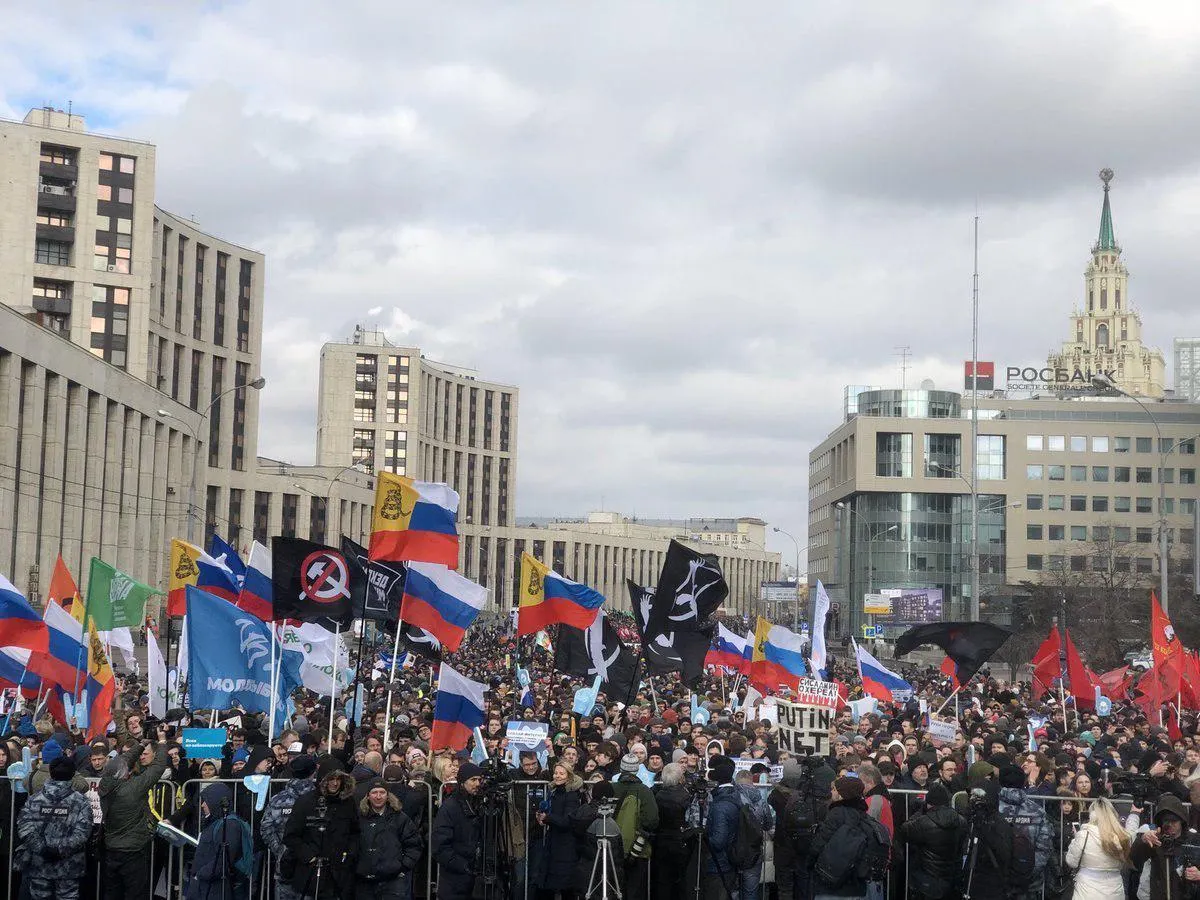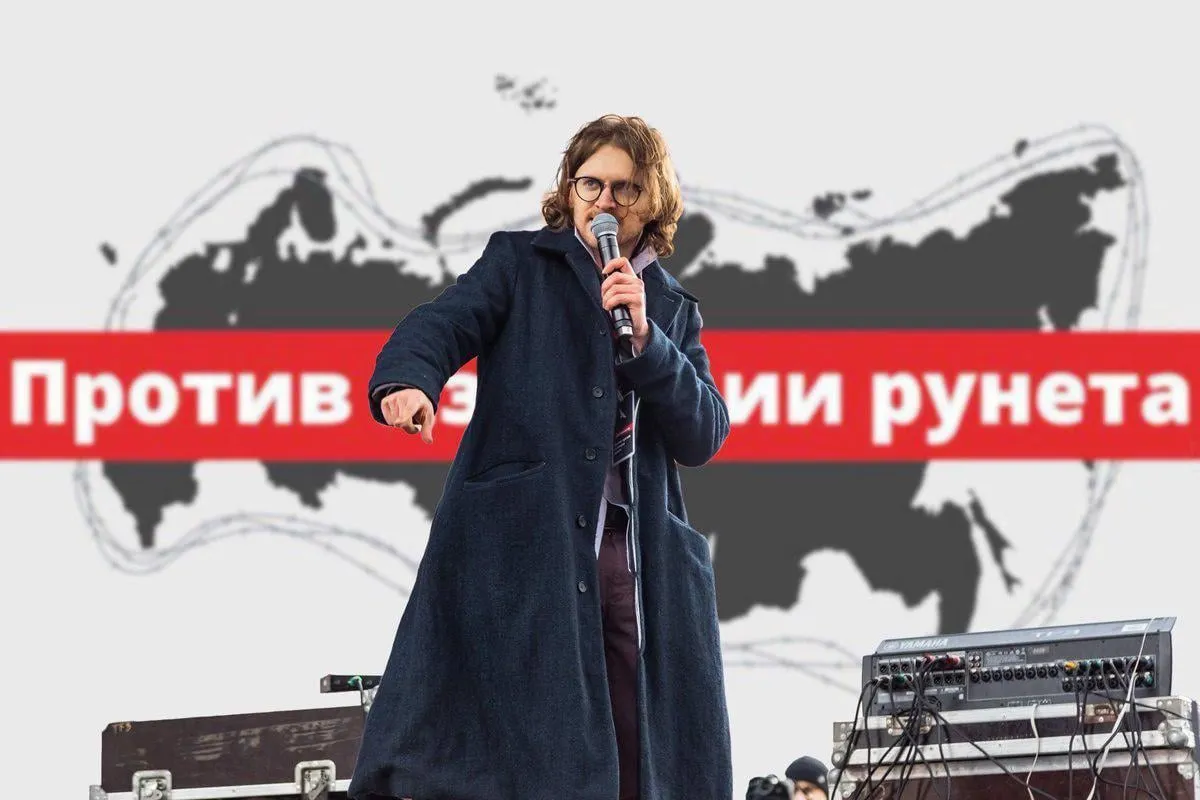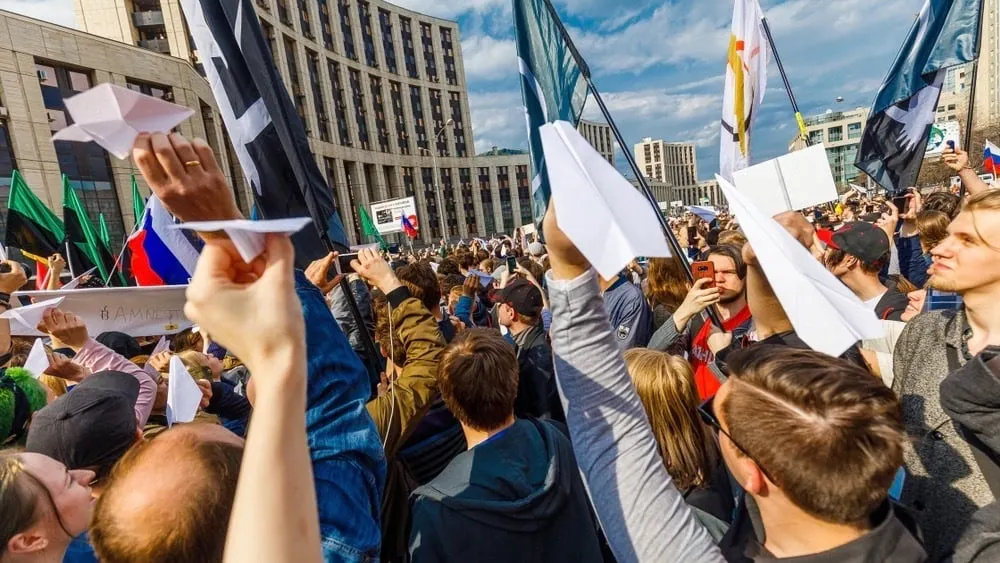A portrait of Russian Internet entrepreneur Pavel Durov—dressed as a saint—was held above the crowd on Sunday, during the biggest demonstrations in Moscow since 2011. Nearly 15,000 people marched to protest government plans for a "stand-alone Internet," a heavily monitored, gated Internet, akin to China's Great Firewall. Some protestors brandished paper airplanes—the icon of the popular messaging app and crypto conclave, Telegram, which was founded by Durov, who is revered throughout Russia. It’s his encrypted technology that is making it possible for rally organizers to operate with impunity.
One demonstrator at today’s protest for internet freedom is holding up a holy “icon” of Pavel Durov, the creator of #Telegram. Russia’s media watchdog has tried unsuccessfully to block it for not giving up its encryption keys to the security services. pic.twitter.com/IcFz3pBPMH
— Emily Sherwin (@EmilyCSherwin) March 10, 2019
"Telegram is the last remaining secure messenger available to Russians today and it’s been under assault from the government for the past year,” says Mikhail Svetov, a spokesman for protest organizers, the Russian Libertarian Party, who spoke to Decrypt via Telegram (what else?) from Moscow.
Telegram, says Svetov, is used by “pretty much everyone in Russia. Putin set to ban it last year, but failed, thanks to Pavel. He’s been pro-active in resisting censorship and created a clever system of changing IP addresses that currently outsmarts the government ban.”
But now the government has plans to do much more than ban Telegram, it’s seeking to sever Russia from the Internet itself. The second reading of the draft law on an “autonomous Internet” will take place in the Russian state parliament, the Duma this week.
If passed, only upper house approval and President Vladimir Putin’s signature stand between plans to cut off the country’s Internet from the outside world, with traffic routed through state controlled channels. In February, the BBC suggested that authorities were planning a test run as early as this spring. This has since been denied by officials and industry executives, but Durov’s Telegram is red hot with rumors and plans for revolt. He has openly supported the protests.
State controlled
The repercussions of Russia’s meddling will also be felt much further afield. According to expert opinion, unplugging Russia form the Internet, even if only temporarily, could destablize the wider Internet, and also impact the mining of both bitcoin and Ethereum, if Russia’s ill-advised “test” were to go ahead.
Little wonder then that a nationwide Internet shutdown, with only a state-controlled intranet as back-up, has sparked fears for Russia’s miners. According to Bitnodes, around three percent of all nodes are located in Russia. They are key components of blockchain technology, processing transactions and maintaining the distributed ledger. While three percent seems a small proportion, it’s enough to upend a system. Yet, aside from Durov, node owners and blockchain-based startups have been slow to overtly take any concrete action to avert the catastrophe.
Russian roots
Durov rose to fame in Russia after setting up a social network Vkontakte, shortly after Facebook was launched. Within a few years it became the most popular social network in Russia and Durov was dubbed the Russian Mark Zuckerberg. But then he fell afoul of the authorities through refusing to hand over the company's encryption keys to the security services. There was little alternative but to either bow to demands or flee abroad. He chose the latter and went onto found Telegram while based in Dubai. It raised $1.7 billion in a token sale in April, 2018.
Unlike investors, Russia’s main security agency, the FSB (a successor to the KGB) was not impressed. It branded Telegram the messenger of choice for "international terrorist organizations in Russia.” And has not let up on its attempts to ban the app since.
But these have somewhat backfired. Russians make up only seven percent of Telegram’s 200 million plus user base, but it’s a very resourceful seven percent. Russian users quickly adapted to the authorities’ ban and continue to access Telegram through VPNs, or virtual private networks.
In fact, reports suggest that attempts to block Telegram have actually encouraged more Russians to start using VPNs, and they’re now accessed by a broader section of the population, which even includes the country’s babushkas (grandmothers.) Private networks also provide access to the 80,000 sites that are currently government-blacklisted, an added bonus for those who have taken the time to instal them. The Russian authorities must be seething.
A nationwide Internet lockdown
Of course, the government strenuously denies that its seeking to curtail any of its citizens’ liberties. The bill, it says, is aimed at improving cyber-security through a national domain name system which will allow the Internet to continue functioning even if the country is cut off from foreign infrastructure.
Not so, says Svetov. “The government is trying to build the same kind of firewall that China has, to ban Telegram for good. If they succeed, it will break the Internet as we know it.”

“Durov is the only one who’s been proactive in resisting the government ban,” says Svetov. “Other companies just leave the market altogether, or cooperate and disclose their keys. He did neither and that makes him very special. Pavel is very popular. He’s one of the very few self-made billionaires Russia has. Everyone else is a crook.”
Telegram libertarians

A well-known libertarian speaker and vlogger, Svetov received a political science degree from the UK’s Nottingham University and then worked abroad before returning to Moscow in 2016. His YouTube channel, where he discusses the social and political topics of the day, has garnered more than 100,000 subscribers.
The Russian authorities are used to controlling TV channels to spread propaganda. When Putin came to power in 2000, only two percent of the population used the Internet. Now, that figure is almost 75 percent and YouTube has become an increasingly popular tool among opposition activists. The platform is viewed by 82 percent of the Russian population aged 18-44.
In April 2018, it was the Libertarians who mobilized 12,000 people to attend Moscow’s protest for Internet freedom and against the Telegram ban.
Durov, in recognition of their efforts and the plight of Russian citizens, continues to switch servers to evade government interference. But he’s also been busy working on the Telegram mainnet and the token, dubbed GRAM, for his startup’s blockchain-based Telegram Open Network (TON) platform. It’s due for release as early as this month and keenly anticipated.
But the prognosis for Russian-based libertarians isn’t quite so good. Svetov told us that he lives in constant fear. “Russia is very tough on opposition. Many of my friends were forced to leave the country. I was attacked twice last year and then I was put in jail for 10 days. So I’m prepared for something bad to happen, but someone has to fight for the cause.”
Saint Pavel will be at his side. Or Durov’s portrait will be, at least.

